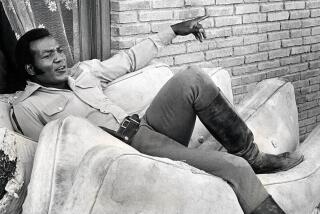MOVIE REVIEW : PEACE AS AN EASY LAYUP IN ‘AMAZING GRACE AND CHUCK’
- Share via
“Amazing Grace and Chuck” (selected theaters) ends with the question, “Wouldn’t it be nice?”--which nicely sets off its intentions and boundaries. It wants to be a fairy tale, an idealistic fantasy about the world’s children and athletes triumphing over the forces of war.
Would that it were. Would that it worked. Ah, wouldn’t it be nice? . . . But the movie has too many thin gimmicks and conflicting ideas: It ends as a jumble of naivete and gigantism, good will crashed on the shoals of formula.
In the story, 12-year-old Little League pitcher Chuck Murdock (Joshua Zuehlke), disturbed by missile silos near his Montana town, suddenly decides to sacrifice his “best thing” until the arms race has ceased: He gives up baseball. Soon, the country’s premier pro basketball player, Boston Celtic Amazing Grace Smith, follows Chuck’s example, retiring in protest. (Smith is played by Denver Nuggets forward and multiple-scoring champ Alex English--though the name obviously suggests Magic Johnson, a probable inspiration.)
Their unofficial movement spreads like wildfire, and gets another surge when corporate and government pro-war forces begin viciously counterattacking. Through it all, the film makers try to create a spellbound mood, one in which we can momentarily believe that the small can triumph over the mighty, the pure in heart over the corrupt and violent of spirit.
Unfortunately, in movies as in life, good intentions aren’t always enough. Fairy tales work by their own whimsical laws, but here there’s a quasi-realistic level that forces us to regard much of what we see as preposterous. Presenting real missile silos, real planes and real pro sports figures (English, football pros Harvey Martin and Dennis Lipscomb, Celtics President Red Auerbach), and then giving us a movie star President (Gregory Peck), who sometimes looks more presidential than the one we’ve got, invites us to envision the film fantasies on a collision course with the real world. That becomes destructive--to the fantasies, not the world.
How can we accept the idea of a sports season collapsing because a few star players take a walk? We might also stumble over a military-industrial complex that apparently consists of one menacing snob, delivering ultimatums in steambaths. And a President and a Soviet premier who sign away all armaments when their grandchildren refuse to talk to them.
Capra’s fables worked because they had the classic ‘30s-’40s Hollywood mix: cynicism and sentiment. “Amazing Grace” is all spice and no bite; it needs a cannier attitude toward its premise. It needs more knowingness, more humor. It’s too inoffensive a movie. It forgets that fairy tales often thrive on their villains and demons.
The central situation here is absurd: a band of docile superstars crammed into a barn near Chuck’s house; children everywhere clamming up in a worldwide sympathy strike; President Peck stooping and scrambling in Chuck’s tiny bedroom for arms negotiations. One howler tumbles after another, all presented with glassy-eyed sobriety. The idea that a professional sports season, let alone a world arms race, could collapse this easily is so giddy that the only real way to play it--the one that might have worked--is for comedy.
Yet writer-producer David Field and director Mike Newell rarely seem to be reaching for laughs. This is a sober, high-minded fairy tale, with little time for levity; its tone is set by Zuehlke, an acting amateur and actual Minnesota Little League pitcher, who almost never cracks a smile.
The movie’s notion--that America’s sports obsession is so deep-seated that a mass movement by the stars would alter the world power struggle--sounds unhappily like the equally naive and far more bellicose fantasies of “Rocky IV,” another one-man-against-the-system wish-fulfillment story. In a way, it’s solipsistic. Chuck takes his stand; all sports follow him, even move right in with him. An industry collapses, America’s superpowers are left speechless and the world beats a path to his door. Yet, the major conflict remains the one between Chuck and his pilot dad (William L. Petersen)--and when it’s resolved, in a way, the crisis is over.
Flabbergasting as most of this is, you have to sympathize with the people involved. Peck, as always, plays with great, calm, measured dignity and quiet force. Alex English has a disarmingly gentle charisma, though it seems a criminal waste not to show more of his playing. As his manager, Jamie Lee Curtis is fetching as ever, and William L. Petersen gives another of his tightly wound, flawed macho performances. Director Newell gets a hard, clean poetics) out of the Montana landscapes. He’s reaching hard for heartland Americana--perhaps as a contrast to his dark last film, “Dance With a Stranger”--and sometimes, visually, he gets it.
But the movie never achieves its fantasy epiphanies of good will and peace. It might have been better if Chuck’s protest were confined to a smaller arena: his hometown, and the nearby missile silos. Putting the whole world in his hands--and every ICBM in his glove--is too much for a 12-year-old, even in the era of Rambo.
‘AMAZING GRACE AND CHUCK’ A Tri-Star Pictures release of a Tri-Star/Rastar presentation of a Turnstar/David Field production. Producer David Field. Director Mike Newell. Script Field. Executive producer Roger M. Rothstein. Executive consultant Ted Turner. Camera Robert Elswit. Editor Peter Hollywood. Music Elmer Bernstein. With Alex English, Joshua Zuehlke, Jamie Lee Curtis, Gregory Peck, William L. Petersen, Lee Richardson.
Running time: 1 hour, 55 minutes.
MPAA rating: PG (parental guidance suggested; some material may not be suitable for children).
More to Read
Only good movies
Get the Indie Focus newsletter, Mark Olsen's weekly guide to the world of cinema.
You may occasionally receive promotional content from the Los Angeles Times.










